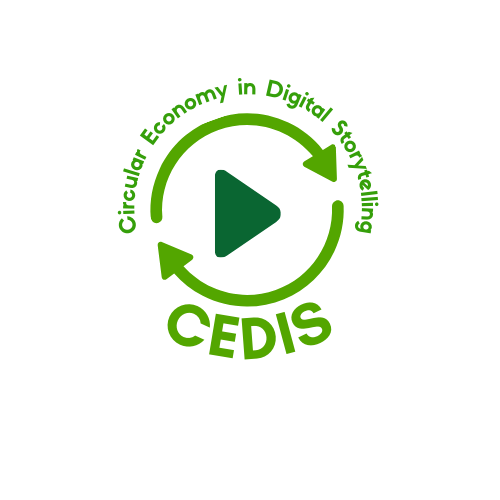
CEDIS
Circular Economy in Digital Storytelling
Field: School Education
Project number: 2023-1-DE03-KA220-SCH-151214
Project Duration: 01.12.2023 – 30.11.2025 (24 months)
CEDIS priorities
The main priority of the CEDIS project is to build an innovative and creative educational approach for the teaching of Circular Economy Education, based on the Digital Storytelling Methodology and aimed at improving the teachers’ and their students’ digital skills and key competencies.
During the CEDIS project, teachers and teaching trainees will be supported in the acquisition of competencies for teaching ICTs and digital skills to their students, through the creation of Digital Stories regarding Circular Economy.
More about CEDIS
The project Circular Economy in Digital Storytelling (acronym: CEDIS) aims at reconsidering the concepts of “circular economy”, “sharing”, “efficiency”, “sustainable development” and “daily behaviour” across Europe, in order to regulate and tone down the impact of Climate Change on participants’ lives. Inclusion and diversity, environment, Circular Economy, the Digital Storytelling Methodology and the digital conversion approach are CEDIS’ principal pillars.
The project builds on the conviction that methods are best learned when they are clearly related to contents, because then the understanding does not remain superficial.
For this reason, the provided training and the use of ICTs will not be restricted to technical instructions, or just video editing: to improve digital skills, it might be more appropriate telling a story through photos, animations, sketches, articles, etc. Focus will thus be given to the pedagogically effective and cooperative-oriented use and development of digital teaching (and learning) materials.
What are the objectives of CEDIS?
CEDIS objectives are as follows:
- To address digital transformation through the development of digital readiness, resilience and capacity;
- To support teachers, school leaders and other teaching professions;
- Environment and fight against climate change.
Main results of the project:
- Report on existing and updated digital tools and practices, and 6 National Reports on Climate Change Education;
- Collections of high-quality resources on Digital Storytelling and Circular Economy;
- A set of educational tools for teaching Circular Economy;
- Around 60 Digital stories;
- International training of a group of around 20 teachers from the partner schools, and selected teaching trainees;
- 6 National Dissemination Conferences and 2 Local Dissemination Events.
CEDIS target groups are:
TG1: Teachers and trainers who need support in acquiring ICTs and digital skills to teach their students about Circular Economy.
TG2: Students/Learners who want to develop a deep understanding regarding Circular Economy with the use of innovative methodology.
Other groups: Parents & Education policy-makers.

 Español
Español Polski
Polski Turkish
Turkish Português
Português Deutsch
Deutsch Italiano
Italiano